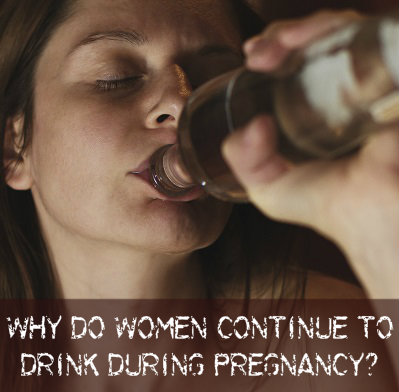Fetal Alcohol Syndrome – Why Do Women Continue To Drink During Pregnancy?
A recent study estimates that close to 10% of pregnant women drink alcohol. Given the potential harm that can come to a fetus when exposed to alcohol during development, and the fact that vast majority of females at child bearing age were probably taught this at some point in their lives, this number is truly upsetting. Unfortunately, it’s also not shocking.
Some people still think that alcoholism (or other forms of addiction) is a moral failing rather than a bona fide medical disorder. Sometimes the impulse to drink can be so great that an alcoholic will put the importance of a drink over the safety and well-being of loved ones. It happens all the time with parents of young children, even when there is overwhelming evidence that the parent is a good person and truly loves their kids. Who doesn’t know someone who grew up in an alcoholic household? Is there any reason to think that the simple fact of pregnancy would be able to reign in such a terrible disease?
Condemning Addicted Pregnant Women vs. Helping Them Abstain From Alcohol
 Instead of chastising and condemning pregnant women who drink, we should be devising ways to help them abstain from alcohol during gestation. For hard core alcoholics, it is entirely possible that the only way to stop them from drinking for close to a year would be to physically restrain them. Barring that, however, there are things that we can do to try to reduce the incidence of drinking while pregnant.
Instead of chastising and condemning pregnant women who drink, we should be devising ways to help them abstain from alcohol during gestation. For hard core alcoholics, it is entirely possible that the only way to stop them from drinking for close to a year would be to physically restrain them. Barring that, however, there are things that we can do to try to reduce the incidence of drinking while pregnant.
We, as a society, must be more proactive in teaching people about the risk of fetal alcohol syndrome, a complication that can happen if a mother drinks while pregnant. People born with fetal alcohol syndrome will likely have abnormal faces, growth issues, and problems in the central nervous system. These issues will not improve over time and the neurological impairments can lead to learning disabilities and behavioral issues, like attention deficit disorder. Fetal alcohol syndrome affects up to 3 million people in the US alone.
The problem with teaching about the dangers of fetal alcohol syndrome is that evidence is murky when it comes to determining how much alcohol can safely be consumed before a fetus is put at risk. It used to be, at least prior to the 1980‘s, that doctors never restricted women from drinking alcohol during pregnancy. However, at some point the medical establishment changed its tune and soon no amount of alcohol was permitted during pregnancy. Now, conflicting information can be found everywhere.
How Exactly Does Fetal Alcohol Syndrome Happen?
Babies do not inherit fetal alcohol syndrome. Instead, the ingested alcohol actually damages developing neurons and destroys brain cells. The damage can occur at any point in fetal development, even before the mother knows that she is pregnant. Once the cells have been compromised, there is presently no way to undo the damage.
Educate Teens On Abstaining From Alcohol If Having Sex
Without knowing exactly how much alcohol is safe for fetuses, the only safe option for pregnant women is to avoid drinking altogether. Since drug-related birth defects affect not only the child but society in general, more resources need to be expended to help keep pregnant alcoholics sober during gestation and continually remind women of all ages about the dangers of exposing themselves to toxic substances if there is a chance they could become pregnant. Since alcohol and sex many times go hand in hand, it is a responsible and appropriate discussion to have with kids, especially given how prevalent substance abuse is in some sub-teen populations.
Addiction During Pregnancy – All Of Our Concern
In addition to increasing the amount of materials available to women of child-bearing age regarding the dangers of drinking, medical professionals in all venues need to be more vigilant in identifying mothers who are actively drinking or are at risk of developing a drinking problem during pregnancy. Although alcohol rehab programs have begun offering specialized treatment programs for addicted mothers, the number of available beds is woefully inadequate to handle the sheer number of people requiring treatment. Hopefully governments will begin to see addiction during pregnancy as a public health crises and funnel adequate resources into handling the disease. If someone you know is drinking during pregnancy, encourage them to seek help.



